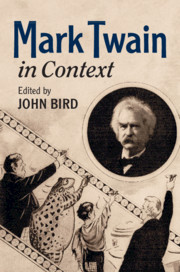Book contents
- Mark Twain in Context
- Mark Twain in Context
- Copyright page
- Contents
- Figures
- Contributors
- Preface
- Acknowledgments
- Chronology
- Abbreviations
- Part I Life
- Part II Literary Contexts
- Part III Historical and Cultural Contexts
- Chapter 15 Politics
- Chapter 16 Business and Economics
- Chapter 17 Religion
- Chapter 18 Science and Technology
- Chapter 19 Race and Ethnicity
- Chapter 20 Race and Ethnicity
- Chapter 21 Race and Ethnicity
- Chapter 22 Cosmopolitanism
- Chapter 23 Gender Issues
- Chapter 24 Gender Issues
- Chapter 25 History
- Chapter 26 Animals and Animal Rights
- Chapter 27 Nationalism and Anti-Imperialism
- Chapter 28 Philosophy
- Part IV Reception and Criticism
- Part V Historical, Creative, and Cultural Legacies
- Further Reading
- Index
- References
Chapter 27 - Nationalism and Anti-Imperialism
from Part III - Historical and Cultural Contexts
Published online by Cambridge University Press: 12 December 2019
- Mark Twain in Context
- Mark Twain in Context
- Copyright page
- Contents
- Figures
- Contributors
- Preface
- Acknowledgments
- Chronology
- Abbreviations
- Part I Life
- Part II Literary Contexts
- Part III Historical and Cultural Contexts
- Chapter 15 Politics
- Chapter 16 Business and Economics
- Chapter 17 Religion
- Chapter 18 Science and Technology
- Chapter 19 Race and Ethnicity
- Chapter 20 Race and Ethnicity
- Chapter 21 Race and Ethnicity
- Chapter 22 Cosmopolitanism
- Chapter 23 Gender Issues
- Chapter 24 Gender Issues
- Chapter 25 History
- Chapter 26 Animals and Animal Rights
- Chapter 27 Nationalism and Anti-Imperialism
- Chapter 28 Philosophy
- Part IV Reception and Criticism
- Part V Historical, Creative, and Cultural Legacies
- Further Reading
- Index
- References
Summary
Especially in his later years, Twain became an outspoken critic of American nationalism and American and European colonialism. The Spanish-American War and atrocities in the Philippines led him to begin making public comments about imperialism. He was a member of the leading anti-imperialism society, and polemics like King Leopold’s Soliloquy were widely distributed and read. Twain’s increasingly bitter and satiric comments about imperialism lost him some readers but gained him the respect of many around the world.
Keywords
- Type
- Chapter
- Information
- Mark Twain in Context , pp. 274 - 282Publisher: Cambridge University PressPrint publication year: 2020



